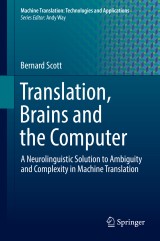Details

Translation, Brains and the Computer
A Neurolinguistic Solution to Ambiguity and Complexity in Machine TranslationMachine Translation: Technologies and Applications, Band 2
|
139,09 € |
|
| Verlag: | Springer |
| Format: | |
| Veröffentl.: | 06.06.2018 |
| ISBN/EAN: | 9783319766294 |
| Sprache: | englisch |
Dieses eBook enthält ein Wasserzeichen.
Beschreibungen
<p>This book is about machine translation (MT) and the classic problems associated with this language technology. It examines the causes of these problems and, for linguistic, rule-based systems, attributes the cause to language’s ambiguity and complexity and their interplay in logic-driven processes. For non-linguistic, data-driven systems, the book attributes translation shortcomings to the very lack of linguistics. It then proposes a demonstrable way to relieve these drawbacks in the shape of a working translation model (Logos Model) that has taken its inspiration from key assumptions about psycholinguistic and neurolinguistic function. The book suggests that this brain-based mechanism is effective precisely because it bridges both linguistically driven and data-driven methodologies. It shows how simulation of this cerebral mechanism has freed this one MT model from the all-important, classic problem of complexity when coping with the ambiguities of language. Logos Model accomplishes this by a data-driven process that does not sacrifice linguistic knowledge, but that, like the brain, integrates linguistics within a data-driven process. As a consequence, the book suggests that the brain-like mechanism embedded in this model has the potential to contribute to further advances in machine translation in all its technological instantiations.</p><p></p>
1 Introduction.- 2 Background.- Logos Model Beginnings.- Advent of Statistical MT.- Overview of Logos Model Translation Process.- Psycholinguistic and Neurolinguistic Assumptions.- On Language and Grammar.- Conclusion.- 3 – Language and Ambiguity: Psycholinguistic Perspectives.- Levels of Ambiguity.- Language Acquisition and Translation.- Psycholinguistic Bases of Language Skills.- Practical Implications for Machine Translation.- Psycholinguistics in a Machine.- Conclusion.- 4– Language and Complexity: Neurolinguistic Perspectives .- Cognitive Complexity.- A Role for Semantic Abstraction.- Connectionism and Brain Simulation.- Logos Model as a Neural Network.- Language Processing in the Brain.- MT Performance and Underlying Competence.- Conclusion.- 5 – Syntax and Semantics: Dichotomy or Integration? .- Syntax versus Semantics: Is There a Third, Semantico- Syntactic Perspective?.- Recent Views of the Cerebral Process.- Syntax and Semantics: How Do They Relate?.- Conclusion.- 6 –Logos Model: Design and Performance.- The Translation Problem.- How Do You Represent Natural Language?.- How Do You Store Linguistic Knowledge?.- How Do You Apply Stored Knowledge To The Input Stream?.- How do you Effect Target Transfer and Generation?.- How Do You Deal with Complexity Issues?.- Conclusion.- 7 – Some limits on Translation Quality.- First Example.- Second Example.- Other Translation Examples.- Balancing the Picture.- Conclusion.- 8 – Deep Learning MT and Logos Model.- Points of Similarity and Differences.- Deep Learning, Logos Model and the Brain.- On Learning.- The Hippocampus Again.- Conclusion.- Part II.- The SAL Representation Language.- SAL Nouns.- SAL Verbs.- SAL Adjectives.- SAL Adverbs.<p></p>
<p>This book is about machine translation (MT) and the classic problems associated with this language technology. It examines the causes of these problems and, for linguistic, rule-based systems, attributes the cause to language’s ambiguity and complexity and their interplay in logic-driven processes. For non-linguistic, data-driven systems, the book attributes translation shortcomings to the very lack of linguistics. It then proposes a demonstrable way to relieve these drawbacks in the shape of a working translation model (Logos Model) that has taken its inspiration from key assumptions about psycholinguistic and neurolinguistic function. The book suggests that this brain-based mechanism is effective precisely because it bridges both linguistically driven and data-driven methodologies. It shows how simulation of this cerebral mechanism has freed this one MT model from the all-important, classic problem of complexity when coping with the ambiguities of language. Logos Model accomplishes this by a data-driven process that does not sacrifice linguistic knowledge, but that, like the brain, integrates linguistics within a data-driven process. As a consequence, the book suggests that the brain-like mechanism embedded in this model has the potential to contribute to further advances in machine translation in all its technological instantiations.</p>
Addresses fundamental issues to solve the classic problems with machine translation Recounts the little known background of early events affecting the history of machine translation Identifies complexity as principal reason why machine translation has had limited success Illustrates problems of ambiguity and complexity in various present-day machine translation models, rule-based (RBMT), statistical (SMT) and neural MT (NMT)
<div>Addresses fundamental issues to solve the classic problems with machine translation</div><div><br></div>Recounts the little known background of early events affecting the history of machine translation<div><br></div><div>Identifies complexity as principal reason why machine translation has had limited success </div><div><br></div><div>Illustrates problems of ambiguity and complexity in various present-day machine translation models, rule-based (RBMT), statistical (SMT) and neural MT (NMT)</div>
Diese Produkte könnten Sie auch interessieren:

Machine Learning and Metaheuristic Computation

von: Erik Cuevas, Jorge Galvez, Omar Avalos, Fernando Wario

115,99 €
















